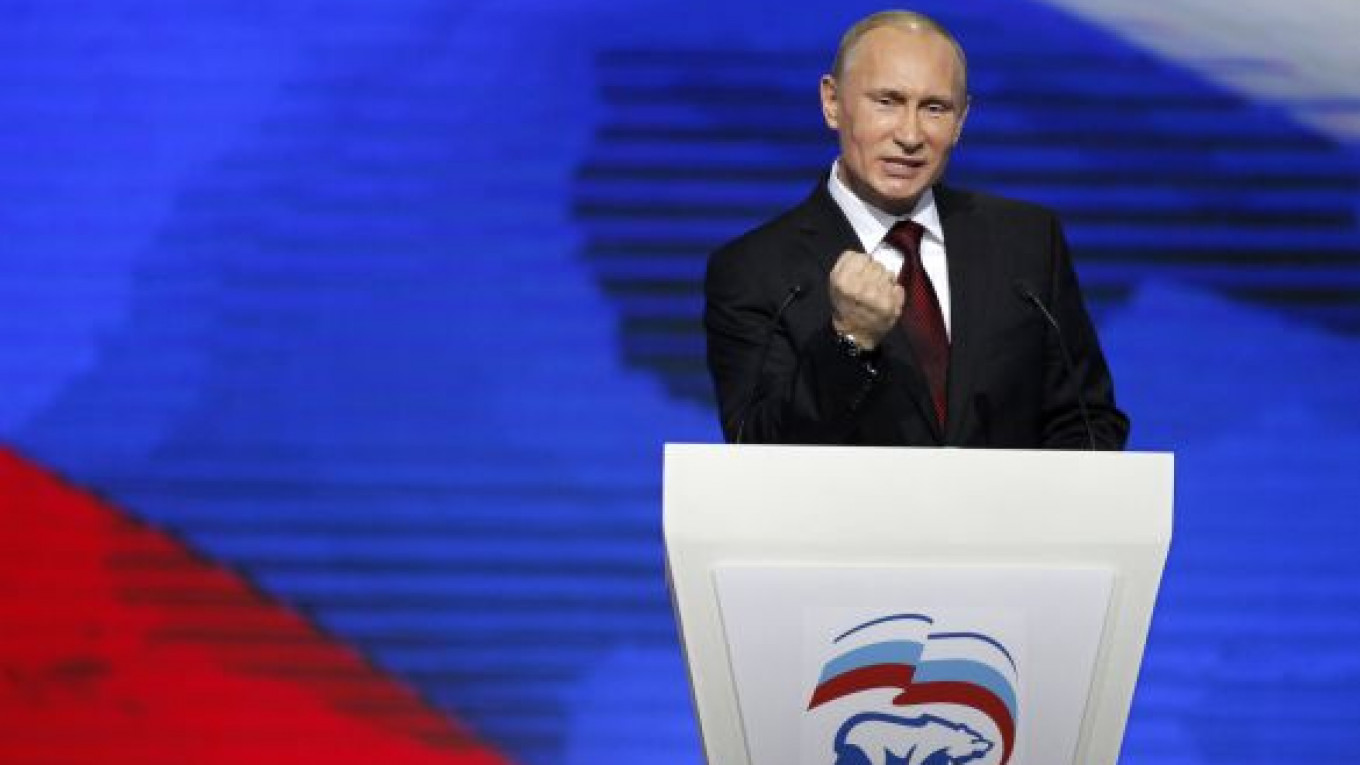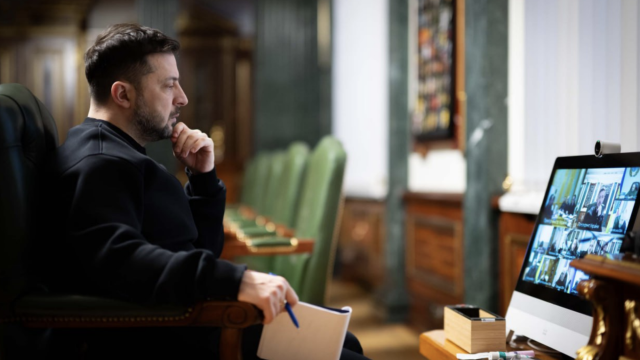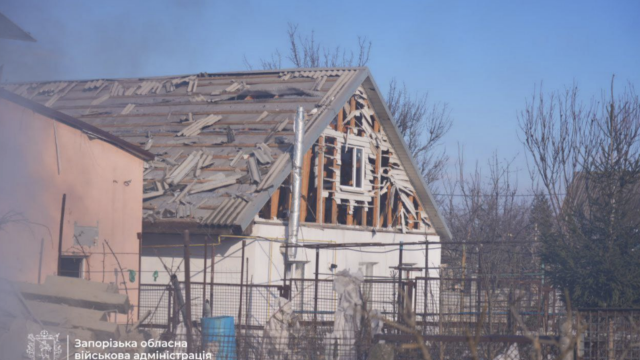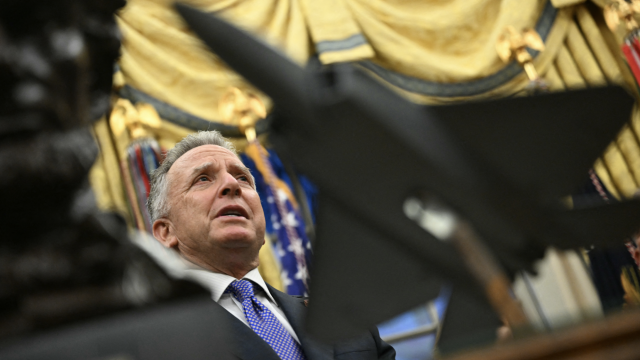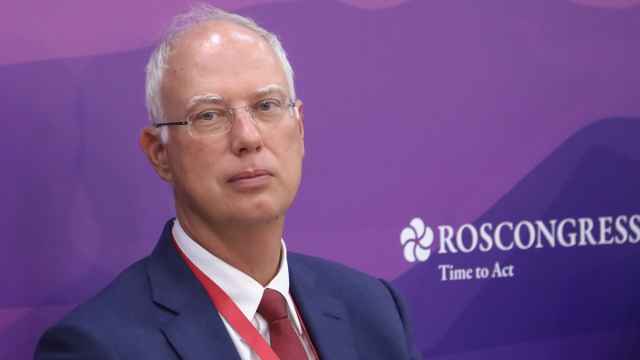In a show of unity amid sagging ratings and growing public dissatisfaction, United Russia on Sunday nominated its leader Vladimir Putin as its presidential candidate Soviet-style — with 614 of 614 ballots cast in his favor.
The somewhat raucous party convention at the packed Luzhniki sports complex, which also kicked off the campaign for the March presidential election, was largely a Putin lovefest.
But the ostentatious, sports stadium-like atmosphere left observers wondering whether it were staged to counter embarrassing reports last week that fans greeted Putin with boos and catcalls at a mixed martial arts fight at the city's Olimpiisky stadium.
The convention came as two leading pollsters announced that United Russia would lose its constitutional majority in the next State Duma. Perhaps in reaction to this, Putin reverted to old alarmist rhetoric, accusing Western powers of meddling in Russian elections.
In a held before the vote on Sunday, Putin called upon some 11,000 supporters at Luzhniki to ensure that United Russia — the party he chairs although he is not a member — wins next Sunday's Duma elections.
Putin argued that under his party's leadership the country had largely weathered the 2008-09 economic crisis.
"I therefore reckon that every thinking, objective and serious person who wants the best for himself, his children and Russia, will support United Russia at the Dec. 4 Duma elections, where Dmitry Medvedev leads the [party] list," he said.
The event was officially part two of a party convention that began on Sept. 24 when President Dmitry Medvedev announced that he would not stand for re-election and instead endorsed Putin, who already served two presidential terms between 2000 and 2008.
Medvedev has said he was ready to become prime minister after his term ends next May, but to the surprise of many, Putin did not say anything about Medvedev's political future this time.
Putin did, however, give a soft hug to Medvedev when he returned to his seat after his speech. In the September convention, Putin greeted Medvedev with a hug as the president returned from his speech. Then, same as now, they both sat next to each other in Row 6.
Speaking before his mentor this Sunday, Medvedev praised United Russia by claiming that the country's improved standard of living since 2000, including a seven- to eightfold rise in salaries, is a result of the party's work.
But he also made some trademark criticism of the government, saying "everybody is fed up with corruption and with the system's stupidity."
Medvedev — who is also not a party member — had an ambiguous relationship with United Russia before Putin announced in September that the outgoing president would head the party's ticket for the Duma elections.
But this time, Medvedev made an effort to lash out at the opposition: "Our opponents have been saying empty words and bulldozing the ruling party for the past years," while "failing" to succeed in their own jobs, he said.
Both leaders' speeches were received with enthusiasm by flag-waving crowds made up of activists of the party's youth wing, the Young Guard, who repeatedly burst into chants of "People-Medvedev-Putin," "Putin-Putin" and "Russia-Russia."
Medvedev was forced to interrupt his speech twice because the chants became too loud.
But when Putin was faced with fresh "Russia" chants during his speech, he did the opposite by saying they were too weak.
"When you shout Putin or Medvedev that's nice, but when it's 'Russia,' it should be the whole hall — so let's try that again," he told the crowd, which duly rose to deafening "Russia-Russia" chants under Putin's direction.
This formed a sharp contrast to the recent Olimpiisky embarrassment, when Putin, who came to the stage to congratulate a Russian champion on his victory — and arguably bask in his reflected glory — had to speak over a hail of jeers.
"In Luzhniki the reaction to Putin is better than in Olimpiisky," tweeted Pavel Fedenko, a BBC journalist.
Putin showed himself in good form, announcing further benefits to voters such as increasing taxes on luxury goods and "excess consumption" and criticizing businessmen who funnel assets offshore or evade social obligations.
He also accused the West of trying to influence the elections.
"We know that in the run-up to elections certain foreign states pay money to so-called grant receivers and instruct them to do their work so that it influences the election campaign," he said, adding that this was wasteful spending.
He compared those who take foreign grants to Judas, noting that "he isn't the most respected biblical figure among us, and it is better to use this money to reduce government debt."
Under Putin's first two presidencies, the Kremlin waged a campaign against Western nongovernmental organizations in the country, accusing them of being behind democratic revolutions in Georgia and Ukraine and plotting for a similar development in Moscow.
The rousing speech was followed with delegates unanimously confirming Putin as the ruling party's presidential candidate in a secret ballot.
United Russia officials said the convention kicked off the presidential election campaign, two days after the Federation Council, the nation's upper house of parliament, set the official date for the vote — March 4.
But to many observers the convention looked like a desperate show of force one week before a crucial vote for the Duma, which pollsters say could result in a painful blow for United Russia.
According to surveys released by the Levada Center and VTsIOM pollster Friday, the party is set to lose its huge majority in next Sunday's elections, winning just 53 percent of the vote.
That result would translate into 252 or 253 places in the 450-seat lower house of parliament, down from the current 315, Levada said. (See table)
But the Kremlin has already accepted that United Russia won't play in the same league as it does now, a media report said Friday.
Vladislav Surkov, a powerful Kremlin spin doctor who oversees national politics, has decided that the party can live with a result of no more than 51 percent because it retains sufficient influence over the remaining parties, the RBC Daily newspaper reported Friday, quoting an anonymous Kremlin official.
"Harmonious voting will be guaranteed in any case" he said.
Still, the Levada survey found that almost half of those who responded — 46 percent — expect that the elections will be manipulated.
Levada's director Lev Gudkov said the results reflect a rising feeling that the elections are being manipulated and dishonest. "United Russia is conducting quite a weak electoral campaign," Gudkov was quoted as saying by Reuters.
| “How would you vote in the Duma elections if they were held this Sunday?” | ||||
| Party | %,
Levada | Seats,
Levada | %,
VTsIOM | Seats,
VTsIOM |
| United Russia | 53 | 253 | 53.7 | 262 |
| Communist Party | 20 | 94 | 16.7 | 82 |
| Liberal Democratic Party | 12 | 59 | 11.6 | 57 |
| A Just Russia | 9 | 44 | 10 | 49 |
| Yabloko | 1 | - | 2.9 | - |
| Right Cause | 1 | - | 1.7 | - |
| Patriots of Russia | 1 | - | 1.8 | - |
| Levada poll held between Nov. 18 and Nov. 21 and covered 1,591 respondents over 18 years of age. Margin of error 3.4 percentage points.
VTsIOM poll held between Nov. 19 and Nov. 20 and covered 1,600 respondents over 18 years of age and 10 political analysts. Margin of error 3.4 percentage points. | ||||
A Message from The Moscow Times:
Dear readers,
We are facing unprecedented challenges. Russia's Prosecutor General's Office has designated The Moscow Times as an "undesirable" organization, criminalizing our work and putting our staff at risk of prosecution. This follows our earlier unjust labeling as a "foreign agent."
These actions are direct attempts to silence independent journalism in Russia. The authorities claim our work "discredits the decisions of the Russian leadership." We see things differently: we strive to provide accurate, unbiased reporting on Russia.
We, the journalists of The Moscow Times, refuse to be silenced. But to continue our work, we need your help.
Your support, no matter how small, makes a world of difference. If you can, please support us monthly starting from just $2. It's quick to set up, and every contribution makes a significant impact.
By supporting The Moscow Times, you're defending open, independent journalism in the face of repression. Thank you for standing with us.
Remind me later.



